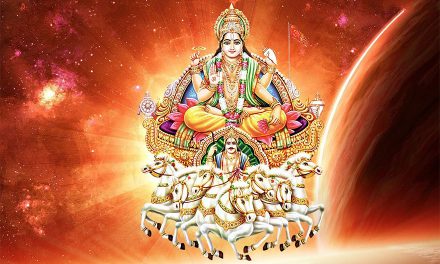The Padma Vesha of Lord Jagannatha is done on any Saturday or Wednesday between the new moon day of Magha and Basanta Panchami. Prior to the month of Magha, we have the winter season when the lotus disappears from the tanks and reservoirs. But from the month of Magha onwards, these flowers reappear. The lotus signifies ‘health and wealth’ at the same time.
The lotus blossoms when the sun rises in the morning, and it is held that Laxmi (the Goddess of Wealth), moves on a fully blossomed lotus. In the fitness of things, Lord Jagannath is dressed with the “Vesha of Lotus”. The lotus is also the National Flower of India, which indicates that gifts of Nature like the lotus must be duly honoured. The Padma Vesha dress materials made of lotus, ‘sola’ lace and paper are supplied by Badachhata Matha. Pudding (Khiri) is offered to the Deities when they are in this Vesha.
The history behind this Padma Vesha is also quite enchanting. The younger brother of the last Ganga King was Mitrabhanu Dev. Mahatma Monohar Das was his revered priest. He was very famous as a devotee of Lord Jagannath throughout the State of Orissa. He was coming to Shrikshetra Puri to see Lord Jagannath after making meditation in Mahindra Hill for a long period. On the way, he came across a big pond full of lotus flowers. Mahatma Das was quite moved with the lotus ponds and stopped on the way. He thought religiously that such beautiful fresh lotus flowers are rightly fit for Lord Jagannath’s adoration.
He plucked lotus to his hearts content. He went to Lord Jagannath Temple carrying the flower throughout the day. He handed over the lotus flower to a servitor (Sevak) with immense interest. The lotus flower carried by him was meant for the adoration of the Deities. But to his disappointment the lotus flowers by that time had been turned black due to delay on the way for two days. The servitor (sevak) of Lord Jagannath refused to decorate the Lord Jagannath with such flowers.
Mahatma Das was quite moved and anxious after hearing such words. All his hopes were turned into despair instantly. He waited near the Lion’s gate of the temple after covering the dried flowers with a cloth. Three days were passed by this time, still then Mahatma Das did not touch water. He promised in his mind that if Lord Jagannath did not accept his flowers, he will sacrifice his life before him for this purpose.
At this critical juncture, the mercy eyes of the Supreme Lord fell upon the dried flowers, as such the dried flowers were turned to fresh lotus flowers. Their beautiful fragrance was spread in the inner compound of the temple. The joy of Mahatma Das knew no bounds when he removed the rejuvenated flowers from his cloths. He was extremely moved due to the mercy of Lord Jagannath by way of removing him from this critical juncture.
The servitor (sevak) of the Lord Jagannath Temple knew about the dried flowers previously. Everybody was astonished to see the wonderful change with their own eyes. Everybody now rightly understood that Mahatma Das was really a staunch devotee of Lord Jagannath. The deula karana (temple Accountant) was ordered to decorate with the flowers as the rejected flowers again became reusable due to the grandeur of the Lord. On this night at the time of Badasinghar Vesha, Lord Jagannath accepted the devotional offering of Mahatma Das.
Lord Jagannath, after the lotus flowers adoration, became heavenly beautiful in the eyes of the devotees. In the memory of this sacred pastimes, Lord Jagannath is adorned with beautiful lotus flowers every year in the month of Magha before Basanta Panchami, Wednesday or Saturday.
At present, the Badachhata Matha, which is adjacent to the Lions Gate, takes the pride for arranging the pudding (khir) and Amalu (Malpua) which is served to the Deities as a tasty offering after the Vesha is over.
All the devotees of Lord Jagannath in and outside the temple enjoy such tasty offerings and become very much happy for the Vesha and the Bhoga of the Jagannath temple made on this auspicious day. The Puspalaka servitor (Singhari sevak) takes the credit for such beautiful adoration and gets self-satisfaction for this purpose.











